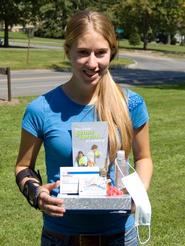
Hamilton College has not experienced any reported cases of the H1N1 virus, also known as swine flu, but the college is taking a proactive stance in preparing for the possibility of an outbreak on campus. “We’re ready,” said Christine Merritt, director of Student Health Services. “Last spring we weren’t sure what was going to happen,” she commented. “Now we’re as ready as we can be.”
College students are considered a high risk group because of their close living conditions in residence halls. The H1N1 virus spreads easily, just like the seasonal flu. “It has become more widespread but hasn’t increased in virulence over the summer,” Merritt said.
Merritt has been meeting with the Hamilton Emergency Response Team (HERT) since last May. “We’re obviously educating the students – through posters, handouts and a booth at the (Sept. 5) activities fair,” she noted. She also met with resident advisors and orientation leaders to discuss the signs and symptoms of H1N1 and urged them to tell students to go to the Health Center or call to discuss their symptoms if they suspect the flu. E-mails outlining precautionary steps the College is taking have been sent to all students, faculty and other employees.
Merritt said the symptoms of the H1N1 virus are similar to seasonal flu: fever, cough, runny or stuffy nose and sore throat. Fatigue, headaches, chills and body aches may also be present. One of the distinguishing characteristics of the H1N1 virus is a temperature of at least 100 degrees Fahrenheit when other symptoms are present. People are sicker for longer with H1N1, she explained.
If a student exhibiting flu symptoms comes into the Health Center the staff will give him or her a flu kit containing tissues, a hand sanitizer, mask and thermometer. If the student is diagnosed with the H1N1 virus a plan is in place.
Students diagnosed with the H1N1 virus will be required to self-isolate from the rest of the campus community and meals will be delivered to them by Bon Appétit, the college’s food service provider. Those with private or semi-private bathrooms will be permitted to remain in their residence hall rooms, others will be relocated to other spaces on campus. “The Centers for Disease Control and Prevention (CDC) has recommended isolation for seven days or until there is no longer a fever without taking Tylenol,” Merritt explained.
A clinic for students to receive the seasonal flu vaccine will take place on Wednesday, Sept. 16. Merritt said the vaccine helps boost the immune system and is 78 percent effective for seasonal flu but is not effective against the H1N1 influenza virus. “As soon as a vaccine for H1N1 becomes available we’ll be aggressive in trying to obtain it and administer it as recommended by the CDC,” she said.
In addition to getting the vaccine for seasonal flu, Merritt recommended that hand washing with soap and hot water is the best preventive measure, along with practicing “respiratory etiquette” -- covering your nose and mouth with a tissue when you sneeze or cough, and keeping commonly used surfaces such as doorknobs, computer keyboards and hand rails clean.
College students are considered a high risk group because of their close living conditions in residence halls. The H1N1 virus spreads easily, just like the seasonal flu. “It has become more widespread but hasn’t increased in virulence over the summer,” Merritt said.
Merritt has been meeting with the Hamilton Emergency Response Team (HERT) since last May. “We’re obviously educating the students – through posters, handouts and a booth at the (Sept. 5) activities fair,” she noted. She also met with resident advisors and orientation leaders to discuss the signs and symptoms of H1N1 and urged them to tell students to go to the Health Center or call to discuss their symptoms if they suspect the flu. E-mails outlining precautionary steps the College is taking have been sent to all students, faculty and other employees.
Merritt said the symptoms of the H1N1 virus are similar to seasonal flu: fever, cough, runny or stuffy nose and sore throat. Fatigue, headaches, chills and body aches may also be present. One of the distinguishing characteristics of the H1N1 virus is a temperature of at least 100 degrees Fahrenheit when other symptoms are present. People are sicker for longer with H1N1, she explained.
If a student exhibiting flu symptoms comes into the Health Center the staff will give him or her a flu kit containing tissues, a hand sanitizer, mask and thermometer. If the student is diagnosed with the H1N1 virus a plan is in place.
Students diagnosed with the H1N1 virus will be required to self-isolate from the rest of the campus community and meals will be delivered to them by Bon Appétit, the college’s food service provider. Those with private or semi-private bathrooms will be permitted to remain in their residence hall rooms, others will be relocated to other spaces on campus. “The Centers for Disease Control and Prevention (CDC) has recommended isolation for seven days or until there is no longer a fever without taking Tylenol,” Merritt explained.
A clinic for students to receive the seasonal flu vaccine will take place on Wednesday, Sept. 16. Merritt said the vaccine helps boost the immune system and is 78 percent effective for seasonal flu but is not effective against the H1N1 influenza virus. “As soon as a vaccine for H1N1 becomes available we’ll be aggressive in trying to obtain it and administer it as recommended by the CDC,” she said.
In addition to getting the vaccine for seasonal flu, Merritt recommended that hand washing with soap and hot water is the best preventive measure, along with practicing “respiratory etiquette” -- covering your nose and mouth with a tissue when you sneeze or cough, and keeping commonly used surfaces such as doorknobs, computer keyboards and hand rails clean.
